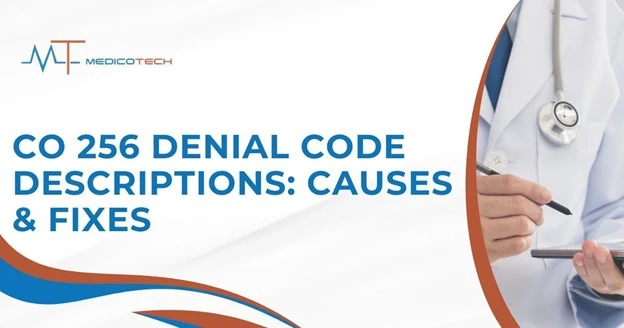The CO 234 denial code is a common issue in medical billing that healthcare providers often encounter. This code indicates that a service or procedure was not paid separately because it is considered part of a bundled service or package that has already been reimbursed. Understanding this denial code is crucial for efficient billing practices and for minimizing the chances of claim rejections. By recognizing the reasons behind CO 234 denials and taking the appropriate steps to address them, providers can streamline their revenue cycle and avoid unnecessary delays in payments.
What is the CO 234 Denial Code?
The CO 234 denial code refers to a situation in medical billing where a service or procedure was not reimbursed separately because it was bundled into another service or procedure provided on the same date. This typically occurs when the payer (insurance company) determines that the billed service is considered part of a larger, more comprehensive service, and therefore does not warrant separate payment.
CO 234 is essentially a notification that the procedure or service billed cannot be paid for independently because it is part of a broader bundle. This commonly occurs in the context of global surgical packages or specific payer bundling rules, where certain related services are grouped together under one reimbursement.
The CO 234 denial code frequently occurs in scenarios where services, like pre operative, intra operative, and post operative care, are provided as part of a comprehensive treatment or surgical package. Insurance payers may deny separate claims for these services because they are included in the original procedure’s reimbursement. This is common in global surgical packages, which include everything related to a surgery, or under the bundling rules of various insurance providers.
Common Reasons for Receiving a CO 234 Denial
Bundled Services
Bundled services refer to multiple related services that are packaged together and paid under a single reimbursement code. When a provider attempts to bill for a service that is already covered under another related service or procedure, the payer will issue a CO 234 denial. This typically happens in cases where multiple services are naturally combined, such as a routine office visit being bundled with a surgical procedure performed on the same day.
For instance, if a physician performs an in office procedure and a follow up consultation, the payer may decide that the consultation is already included in the primary procedure’s reimbursement and will not pay for it separately.
Global Surgical Packages
A global surgical package includes all services associated with a surgery pre operative, intra operative, and post operative care. These services are considered part of a single payment under the global package, and providers are not reimbursed separately for each component of the care provided.
For example, if a patient undergoes an appendectomy, the global surgical package typically includes the surgery itself, anesthesia, follow up visits, and any necessary post operative care. Attempting to bill separately for services such as the follow up visit or post op care during the global period may trigger a CO 234 denial.
Incorrect Modifier Usage
Modifiers are used in medical billing to indicate that a procedure has been altered or that it has been performed under specific circumstances. However, incorrect modifier application can lead to denials. For example, if a modifier is used incorrectly to separate bundled services that should be grouped together, the payer may still treat the service as part of the original bundle and issue a CO 234 denial.
It is crucial to use modifiers appropriately and in compliance with payer guidelines. Misapplying a modifier in an attempt to unbundle a service that is part of a global package can result in claim rejection.
Payer Specific Bundling Rules
Different insurance payers have their own unique bundling rules that determine what services can be billed separately and which services should be bundled together. These rules vary widely between insurance companies, and failing to adhere to a specific payer’s bundling policies can result in CO 234 denials.
For instance, one payer may allow certain services to be billed separately, while another may consider them bundled under the same code. This is why it is important for healthcare providers to stay informed about the specific bundling rules for each payer they work with.
How to Address CO 234 Denials
If you receive a CO 234 denial, there are several steps you can take to address and resolve the issue efficiently. Below are the actions you should take when encountering a CO 234 denial:
Review NCCI Edits
The National Correct Coding Initiative (NCCI) edits provide a set of guidelines to determine whether services should be bundled. Checking these edits can help you verify if the service you billed is part of a bundled set, which can help you avoid submitting claims that are inappropriately separated.
By reviewing NCCI edits, you can confirm whether a service is appropriately bundled with another and whether your billing is in compliance with national standards.
Check Modifier Usage
Ensure that the modifiers applied to the service were used correctly. Modifiers are essential for distinguishing certain services from others, but if used incorrectly, they may result in the CO 234 denial. It’s important to double check that the correct modifier was applied and that you haven’t mistakenly tried to unbundle services that are meant to be bundled.
Verify the correct application of modifiers using payer guidelines, as modifier usage can vary depending on the payer’s policies.
Verify Payer Policy
Every payer has their own bundling rules that determine what services are considered bundled. To avoid CO 234 denials, you must stay informed about each payer’s guidelines and check their policy when billing for services.
Review the payer’s policy manuals or guidelines to determine whether the services you are trying to bill are considered bundled under their specific rules. If the services are part of a bundled package, you will need to adjust your billing accordingly.
Understand the Implication
In many cases, a CO 234 denial indicates that no separate payment will be made for the service, as it is part of a larger bundled procedure. This means that the service is already covered under another reimbursement, and the payer is not willing to pay for it separately.
It’s important to understand this implication to avoid the frustration of attempting an appeal for separate payment. Instead, focus on adjusting your records and resubmitting the claim with the proper coding and adjustments.
What to Do When You Receive a CO 234 Denial
When you receive a CO 234 denial code, it’s important to act quickly to understand the cause of the denial and ensure that your claims are processed smoothly in the future. Here are the key steps you should take:
Step 1: Verify Whether the Service is Bundled
The first thing you should do is verify whether the service in question is part of a bundled set. Review the National Correct Coding Initiative (NCCI) edits to determine if the service is included in a larger bundled service or global package. If the service is bundled with another, it means that no separate reimbursement will be issued for it, and it should not be billed independently.
Step 2: Review the Payment Details and Adjust Records Accordingly
Once you confirm that the service is indeed bundled, review the payment details for the primary service or procedure. Adjust your billing records to reflect that the service cannot be billed separately. This may involve removing the charge or ensuring that it is categorized under the bundled service in your records.
For example, if you incorrectly billed for a post operative visit under a global surgical package, you would remove or adjust that line item to reflect the correct payment structure.
Step 3: Consult with Your Coding or Billing Department
Consult with your coding or billing department to ensure that your team understands the payer’s bundling rules and that the right procedures are followed moving forward. This will help to avoid similar issues in the future. Ensure that the department is familiar with the specific bundling rules for each payer you work with to minimize billing mistakes and CO 234 denials.
How to Prevent CO 234 Denials in the Future
Now that you know how to address a CO 234 denial, it’s time to implement strategies to prevent it from happening in the future. By focusing on education, staying up to date with coding practices, and regularly reviewing payer guidelines, you can reduce the likelihood of this denial code affecting your practice.
Educate Billing Staff
One of the best ways to prevent CO 234 denials is by educating your billing team. Ensure your billing staff is trained on payer specific guidelines for bundling rules, global surgical packages, and correct modifier usage. Regular training and updates on coding practices will help them recognize which services can and cannot be billed separately.
Actionable Tip: Conduct monthly or quarterly training sessions with your billing team to review payer rules, common bundling issues, and any changes in payer policies.
Ensure Up to Date Coding Software
Keep your coding software updated to ensure that it reflects the latest changes in bundling guidelines, payer specific rules, and NCCI edits. Coding software that is out of date can lead to errors in bundling and claims submission. Make sure your software automatically flags potential bundling issues before claims are submitted, so they can be corrected before the payer rejects them.
Actionable Tip: Schedule regular updates for your coding software and use systems that integrate with NCCI edits to detect any bundling issues before submission.
Stay Informed of Payer Policies
Since payer specific bundling rules can differ, it’s essential to stay informed about the policies of the insurance companies you work with. Review payer specific bundling guidelines regularly to ensure you understand their rules and avoid future errors.
Actionable Tip: Set up reminders to check payer policy updates quarterly or annually. Many payers provide updates through newsletters or online portals.
Conclusion
Addressing and preventing CO 234 denials is essential for maintaining an efficient and effective medical billing process. Understanding the causes behind these denials and taking proactive steps to educate your team, use up to date software, and stay informed about payer policies will help minimize errors and ensure smoother claim submissions. By following these practices, you can reduce the chances of CO 234 denials and enhance the overall efficiency of your revenue cycle management.
FAQs
What is a bundled service in medical billing?
A bundled service refers to a set of related medical services that are grouped together and reimbursed under a single payment code, rather than being paid for separately.
Can I appeal a CO 234 denial?
Generally, CO 234 denials cannot be appealed for separate payment. This denial indicates that the service is part of a bundled payment, and no additional payment will be made. The focus should be on adjusting records and ensuring compliance with bundling rules.
How do I know if my procedure is bundled?
You can determine if a procedure is bundled by checking the National Correct Coding Initiative (NCCI) edits or by reviewing payer specific guidelines. Coding software may also alert you to bundled services before submission.
What should I do if I keep receiving CO 234 denials?
If you continue to receive CO 234 denials, review your coding practices and ensure your team is trained on payer specific bundling rules. Consider updating your coding software and conducting regular audits to prevent future denials.
Also Read : Why You Get CO 197 Denial Code ?




